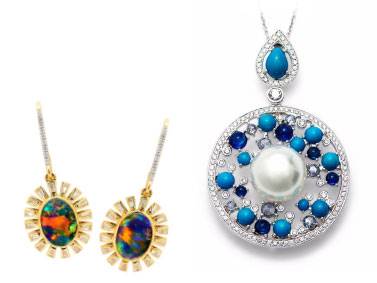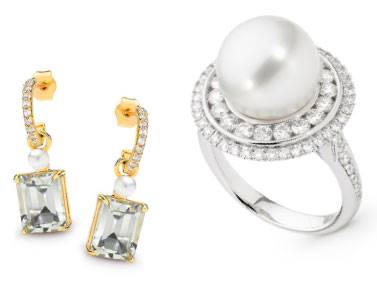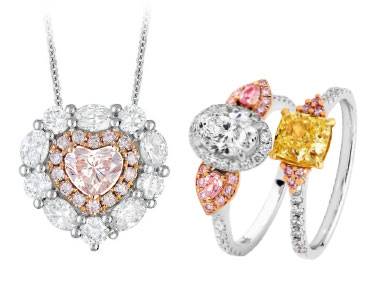The international COVID pandemic disrupted the Australian consumers and suppliers for more than two years in an increasingly globalised jewellery trade.
 |
| Above: Opal Minded; Autore Pearls |
With the closure of international borders causing seemingly endless supply chain headaches for retailers, along with the subsequent impact of inflation, there was one positive to be found for many Australian based manufacturing and brands.
With limited access to international inventory the opportunity arose for home-grown brands to be placed under a brighter, less competitive spotlight. Better still, according to a recent study from market research firm Roy Morgan, an increased focus on Australian brands is exactly the kind of market local consumers hope to see.
The findings of the examination into Australian consumer habits released in July this year revealed that Australians are now less likely to purchase international brands – particularly those originating from China – than they were prior to the pandemic.
“The latest Roy Morgan research into preference for Australian-made goods showed that a high 96 per cent of Australians in March 2022 say they would be more likely to buy a product if they knew it was ‘Made in Australia’ – up
9 per cent points from early in 2020,” the report states.
With most of 2022 now in the rear-view mirror, the question now is have these Australian brands been able to preserve that connection with local consumers?
Identity and trust
Gerri Maunder believes that the Australian identity is uniquely woven into her ethos, which is to offer customers fine jewellery worthy of becoming a family heirloom.
Based in Queensland and armed with more than 25 years of experience in jewellery design and manufacturing, Gerrim International has evolved into a brand that pursues elegance and style with each piece.
Co-director Maunder explains “COVID forced all businesses to re-think how they operate.”
“Our mantra has always been that if a product we offer is made and manufactured in Australia, we will be able to deliver that product to a retailer in 7–10 business days. We’ve always said that, and we’re proud of that part of our business.”
She continues: “Suppliers are, essentially, solution-based businesses. Retailers need stock – and they want the supplier to offer a solution – to provide the stock and deliver it on time. It doesn’t have to be any more complicated than that. We also understand that the jeweller is in turn attempting to offer a solution to their customer.”
Georgini is another Australian jewellery brand that launched in 2004 with the aim of combining modern elegance with innovative fashion-forward design.
Managing director Melinda Carey echoes Maunder’s sentiment and stresses the importance of mutual trust between suppliers and retailers and says brands that focus on capturing the hearts and minds of local consumers possess a unique advantage exiting the pandemic.
“One of the great movements we saw throughout the pandemic was the swing to shop local and support local brands,” Carey tells Jeweller.
“With slow consumerism on the rise, buyers are making conscious and considered choices and choosing brands that have authenticity and story and are home-grown. This is wonderful for the Australian jewellery industry.”
Local diamonds and gemstones
Aside from being a unique and naturally rich country, Australia not only boasts beautiful beaches, diverse wildlife, and the iconic outback. It is also the point of origin for some of the most prized and rare gemstones in the world.
And of course, Australia’s pink diamonds lead the world in rarity. That said the raw material is the starting point, however; what consumers want is products and brands. Ellendale Diamonds Australia is one such business that has helped elevate Argyle pink diamonds to an internationally recognised, and unique, product.
Sales and marketing manager Gersande Price is another who believes that the pandemic made people re-think their lives. She says that offering consumers transparency at every step - from the mine to Ellendale Diamonds, to the retailer and to the eventual buyer, is critical.
“The pandemic, having clipped the wings of us all to be able to travel and source worldwide with ease, we believe has benefited home-grown Australian brands tremendously,” she explains.
“As consumers we have looked to what is available within our own backyard, it has given us a sense of we are in this together and should support our own brands and businesses. We have been given a glimpse of how precious life is and therefore, how important it is to seize the moment.”
Price also believes that the “consumer more than ever is ethically and socially aware and wants reassurance that the pieces they are purchasing have a transparent, ethical supply chain. We champion
this transparency.”
Based in Sydney, SAMS Group Australia has a proud and long family connection with the Australian jewellery industry with brands such as Classique and Pink Kimberley.
The company launched a new range of branded Australian jewellery - Sapphire Dreams – in September 2021.
Steve der Bedrossian, CEO told Jeweller, “I love Australian products, and I always try to use unique materials that are sourced in Australia. The colours of Australian sapphires are amazing, and there was no brand around Australian sapphires, so I realised that it was something that I could create.
“Sapphire Dreams is the first of its kind and the only Australian jewellery brand that celebrates Australian sapphires and their breathtaking colour range, which is unlike anywhere else in the world.”
Pearls
No discussion of Australian jewellery brands would be complete without acknowledging the wide variety on offer when it comes to pearls.
Autore Pearls operates 10 South Sea pearl farms, located in Australia and Indonesia, and is headquartered in Sydney. Each year more than 350,000 pearls are harvested by Autore Pearls, spearheaded by the man who founded the company in 1991 – Rosario Autore.
Autore is another who believes that the pandemic gave local brands the opportunity to deepen a connection with the Australian market.
 |
| Above: Ikecho Australia; Allure South Sea Pearls |
“As the second largest producer and quota holder in Australia, I can confidently say Australian South Sea pearls are widely recognised on the international market as the best and most valuable in the world,” Autore says.
“During the pandemic, tourism to Australia was completely blocked, creating difficulties from a retail perspective for the pearl industry.”
He continues: “Tourists would usually come and buy the beautiful Australia pearls; however the industry lost these clients due to the border closures. On the other hand, the Australian public was not travelling overseas, so they were spending more on Australian products and supporting local businesses including the South Sea pearl industry.”
Operating from Sydney, Ikecho is another Australian brand driven by family background, with managing director Erica Miller leading a team that offers an extensive range of South Sea Tahitian, Akoya, mabe and Chinese freshwater pearls – available in strands or in sterling silver and gold pieces.
Ikecho recently began offering jewellery pairing Australian pearls with opals – a prospect that proved particularly popular with buyers at the International Jewellery Fair in August.
Another pearl producer is Perth-based Atlas Pearls. The company harvests more than 550,000 pearls each year from seven farms located in Indonesia, with white and silver South Sea pearls becoming some of the world’s most sought.
The company aims to produce the valued South Sea pearls – and its jewellery designs - through ethical, sustainable, and non-extractive processes with each pearl certified to reflect the standards it was produced within.
Benefits
While international products are so readily available, are Australian-made products still the smarter selection and what makes them a better option?
• Made to Australian standards: Australia requires businesses to meet some of the world’s strictest business and quality control standards.
When you buy Australian-made products, there’s a greater chance you’re contributing to a business that provides well-crafted top-tier goods, treats and pays its workers fairly, and uses high-quality resources and materials.
• Personalised customer service: Geographical proximity improves the level of customer service available between Australian suppliers and retailers for a range of reasons. It often evolves as a result of long-term connection between suppliers and retailers – a long-term connection made easier when a business is family.
• Warranty support: Under Australian Consumer Law, when you purchase any product or service, they come with an automatic guarantee that they will work and do what you asked for. Furthermore, many Australian companies also offer further warranties and guarantees on their products.
• Local knowledge: Understanding local market conditions and the history behind Australian consumer connection to jewellery is another major potential benefit offered by domestic suppliers.
And it is on the final point that Australian brands believe they have an advantage. Price says local suppliers are able to offer local insight and knowledge that international companies can’t match.
“Sourcing from local brands is of great advantage to retailers on both the local and international stages. Having a local point of contact offers so many pluses.
For example, at Ellendale Diamonds Australia, local retailers can view our inventory prior to selection, including in-store viewing with our friendly and experienced team,” she explains.
Unlike other industries, the international jewellery sector still maintains businesses with a long family history – often over generations – with a legacy to protect. It’s also true for retailers; Australia can demonstrate jewellery stores still in the hands of the family over many decades.
And when coupled with suppliers that began business as local manufacturers supplying to local retailers, it adds to the home-grown feeling of both businesses supporting each other. This fact was endlessly demonstrated throughout the pandemic where consumers went out their way to support local manufacturers, often knowingly paying a higher price.
Being an Australian company became a distinct advantage.
For example, Paterson Fine Jewellery boasts a proud history having been founded in 1935 by Keith Paterson. The company is rapidly approaching the 100-year mark and is currently under the leadership of managing director David Paterson – grandson of the founder.
Another business with a long history is Palloys, established in 1951. When it comes to supplier guarantees it’s difficult to look past the ‘Palloys Promise’ as an industry benchmark – which is a pledge to use 100 per cent Australian refined and internationally accredited precious metals with a price-beat guarantee.
One jewellery business that highlights the significance of quality local manufacturing is Mark McAskill Jewellery. Based in South Australia, it offers jewellers everything from bespoke design to large production runs and aims to provide quick local supply.
Georgini’s Carey agrees with Price and says that local supply and quality customer service can’t be overlooked.
She points to the importance of holding stock for the customer, avoiding six month ordering lead times: “Ease of stock supply and access to excellent staff are the most significant advantages to purchasing locally,” she tells Jeweller.
“When brands have that ‘you need us more than we need you mentality’, it's never great. We have seen this countless times in the last couple of years. Australian brands are not like that! We want all parties to succeed and benefit from a brand's success.”
Alignment
The good news for retailers choosing to stock Australian jewellery brands is that their choices continue to align with
the latest consumer preferences and trends.
A 2021 study completed by market analysts Freshworks titled 'The Post COVID-19 Consumer' offered interesting results. In a bid to understand the lasting impacts of the COVID-19 pandemic on consumer behaviour, the company surveyed 1,000
Australians and compared their responses to 10,500 consumers globally.
The overwhelming majority – 97 per cent - of those that shifted to shopping locally, reported that they are seeking to maintain this behaviour.
 |
| Above: Pink Kimberley Diamonds; Ellendale Diamonds |
Freshworks Australia general manager Sreelesh Pillai says “Australians have always sought to support local, however; we've seen the pandemic further entrench this behaviour.
"This stands alongside an “all in this together” attitude, where we're seeing consumers support businesses that have perhaps struggled in the past 12 months.
"As expected, online shopping has become more popular but not to the extent that we've witnessed in other markets, again this highlights the Australian preference for supporting smaller, local retailers."
Pillai adds, “For retailers looking to win the hearts and minds of Australian consumers, the message is simple: offer an experience that is personalised and meets their needs while treating your own staff well. Australians want to do business with brands that support the local community and are inherently seen as decent.”
It’s foolish to deny that international suppliers don’t also have their fair share of benefits to offer and as the restrictions surrounding the pandemic are erased, consumer interest in products originating from outside the country will likely persist.
However with the most important trading period around the corner, jewellery retailers should consider the benefits of highlighting Australian brands in their product mix – for many, there are too many advantages on offer to overlook.
Read eMag